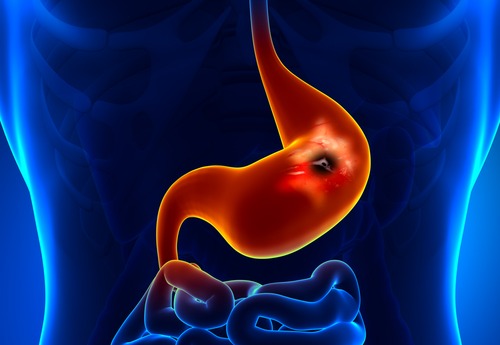What Are the Main Causes of Stomach Aches?


Written and verified by the doctor Nelton Abdon Ramos Rojas
There are many factors that can contribute to stomach pain. This article will explain a few causes of stomach aches, as well as provide you with some simple remedies.
You might like: Why Do I Feel Stomach Pain?
Causes of Stomach Aches
Aches and pain in your abdomen are more common than you would think. In fact, researchers have found that at least 30% of people suffer from this type of ache and although it isn’t technically defined as a disease, it is a slight defect in the digestive system.
The intensity of the pain you feel will determine how serious the stomach ache is. However, if you find that you suffer from these pains quite often and experience some of the other symptoms mentioned below, you should see your doctor. Let’s take a closer look.
What factors are associated with stomach aches?
1. Nerves

Sometimes, anxiety or stress can build up in your second brain, which is your stomach. Nerves are almost always concentrated in this part of your body, and they can have a negative effect on your digestion, causing heartburn or even diarrhea.
So, don’t worry if you experience this type of problem from time to time, because it’s probably just the result of stress. However, now that you know where your stomach aches may be coming from, you should try to manage your anxiety levels to avoid more severe discomfort.
You might like: Reduce Anxiety with These 5 Calming Remedies
2. Gas
This is one of the most common causes of stomach aches. Poor digestion and certain foods can cause irritating stomach gas. These are usually concentrated in the pit of your stomach, just below your ribs. They can cause you to feel sharp pains, especially when you take deep breaths.
3. Heartburn

Gastric reflux and heartburn are also very common ailments that start with stomach pain in the upper part of the stomach. Acids naturally move upwards, meaning that this pain is concentrated in your esophagus, which is found above your digestive system.
4. Irritable bowel syndrome
Intestinal inflammation is one of the more complicated causes of stomach aches. It falls into the category of organic dyspepsia, which is when your digestive system suffers from a disease.
If you have diarrhea or suffer from constipation, vomiting and intense pain on a regular basis, you should see your doctor right away. Irritable Bowel Syndrome (IBS) can masquerade as other conditions and vice versa, so it’s important to get a proper diagnosis from a medical professional.
5. Certain medications

If you take iron supplements or if you have recently taken ibuprofen, for example, you will likely feel some stomach pain. These medications cause you to feel a slight burning in your stomach that lasts for a few hours. It’s nothing too serious, but it is quite bothersome.
6. Eating too quickly
Remember, in order to properly digest your food, you should always try to eat slowly, thus exposing your food to greater quantities of saliva. This element of your digestive system is necessary in order for your previously chewed food to mix together. If you eat too quickly, you will likely end up with a stomach ache.
7. Ulcers

Does your stomach hurt whenever you eat certain foods? Especially when those dishes are heavily seasoned or spicy? Do you suffer from frequent vomiting? Do you ever find blood in your vomit? If you answered yes to these questions, you should see your doctor right away, because you may have an ulcer.
Natural Remedies for a Stomach Ache

- Anise and mint teas after eating: these beverages are great for your digestion, and they will relax your muscles and alleviate stomach pain. You can drink up to 3 cups per day.
- Ginger root tea: this drink calms your stomach while improving your digestion. Don’t hesitate to drink a cup of this tea after dinner; you’ll be sure to see its positive results.
- Sage and chamomile: you’ve certainly heard of the benefits these two medicinal plants offer for the stomach and intestines. In addition to being sedatives, they alleviate pain and inflammation. You can drink up to one liter per day, which will be sure to help with your stomach problems.
- A warm bath and stomach massages: nothing is better at relaxing stomach nerves and tension than a warm bath. After the bath, the best thing you can do is massage your abdominal area with a bit of lavender or almond oil. Massage the area in a circular fashion and then apply a warm cloth. You’ll surely feel better afterward.
- Remember to always chew your food well and eat slowly. We also discourage eating very large meals; ideally, you should eat about five small meals throughout the day, with the greatest emphasis on breakfast and lunch. The lightest meal you eat should be at dinnertime. And don’t forget to drink plenty of liquids.
Now that you are better informed on the causes of stomach aches and a few natural remedies, we hope that you will experience fewer stomach aches and be able to cure them fast when they happen!
All cited sources were thoroughly reviewed by our team to ensure their quality, reliability, currency, and validity. The bibliography of this article was considered reliable and of academic or scientific accuracy.
- American Heart Association. (6 de diciembre del 2022). ¿Acidez estomacal o ataque al corazón? American Heart Association. https://www.goredforwomen.org/es/health-topics/heart-attack/angina-chest-pain/heartburn-or-heart-attack
- Cătinean, A., Neag, M., & Pop, D. (2017). Different presentations of gastroesophageal reflux disease. CABI Digital Library. https://www.cabidigitallibrary.org/doi/full/10.5555/20183200861
- Clínica Mayo. (2022). Gastritis. Clínica Mayo. Consultado el 02 de junio de 2023. https://www.mayoclinic.org/es/diseases-conditions/gastritis/symptoms-causes/syc-20355807
- Hernández, J., León, J., Martínez, M., Guzmán, J., Palomeque, A., Cruz, N., & José, H. (2019). Apendicitis aguda: revisión de la literatura. Cirujano general, 41(1), 33-38. https://www.scielo.org.mx/scielo.php?pid=S1405-00992019000100033&script=sci_arttext
- Hunt, R., Camilleri, M., Crowe, S., El-Omar, E., Fox, J., Kuipers, E., Malfertheiner, P., McColl, K., Pritchard, D., Rugge, M., Sonnenberg, A., Sugano, K & Tack, J. (2015). The stomach in health and disease. Gut, 64(10), 1650–1668. https://doi.org/10.1136/gutjnl-2014-307595
- Kellerman, R., & Kintanar, T. (2017). Gastroesophageal Reflux Disease. Primary Care – Clinics in Office Practice. W.B. Saunders. https://www.sciencedirect.com/science/article/abs/pii/S0095454317300957?via%3Dihub
- Regnault, C. (2017). Masaje: Conozca los principales beneficios del masaje y las técnicas más adecuadas para conseguirlos. Libro Robín.
- MedlinePlus. (s.f.). Síndrome del intestino irritable. MedlinePlus. Consultado el 02 de junio de 2023. https://medlineplus.gov/spanish/irritablebowelsyndrome.html
- McRorie, J. (2018). Heartburn. Nutrition Today, 53(1), 18–25. https://agris.fao.org/agris-search/search.do?recordID=US201900379455
- Nikkhah, M., Maleki, I., Hekmatdoost, A. (2018). Ginger in gastrointestinal disorders: A systematic review of clinical trials. Food Sci Nutr, 7(1), 96-108. https://www.ncbi.nlm.nih.gov/pmc/articles/PMC6341159/
- Segura, M., Sancho, D., & Barrantes, J. (2021). Abordaje del paciente con dispepsia. Revista Médica Sinergia, 6(09). https://www.medigraphic.com/cgi-bin/new/resumen.cgi?IDARTICULO=101687
- Suzuki, H., & Moayyedi, P. (2013). Helicobacter pylori infection in functional dyspepsia. Nature Reviews Gastroenterology and Hepatology. https://www.nature.com/articles/nrgastro.2013.9
- Shojaii, A., & Abdollahi, M. (2012). Review of Pharmacological Properties and Chemical Constituents of Pimpinella anisum. ISRN Pharm. https://www.ncbi.nlm.nih.gov/pmc/articles/PMC3405664/
- Weaver, K., Melkus, G., & Henderson, W. (2017). Irritable bowel syndrome. American Journal of Nursing, 117(6), 48–55. https://doi.org/10.1097/01.NAJ.0000520253.57459.01
This text is provided for informational purposes only and does not replace consultation with a professional. If in doubt, consult your specialist.








